Author: everbella
4 Ways Hormones Disrupt Hair Growth (And What To Do About It)
More Than Just Genetics
Hair thinning affects millions of people, and despite what many think, it’s not always about aging or your family tree.
One of the most overlooked causes of unexpected hair loss? Hormonal imbalances. These invisible shifts inside your body can mess with your hair growth cycle, making strands grow slower, fall out faster, and come back thinner (if at all).
What’s even more frustrating? You might be experiencing these imbalances without even knowing it.
In this blog, we’ll break down the most common hormonal culprits behind hair thinning — like DHT, thyroid issues, and vitamin D deficiency — and explore the powerful nutrients that may help get things back on track.
Whether you’re just starting to notice more shedding or you’ve been battling thinning hair for a while, understanding the hormone-hair connection is key. And the good news? There are ways to support your body from within.
The Hormone-Hair Connection: What’s Really Going On?
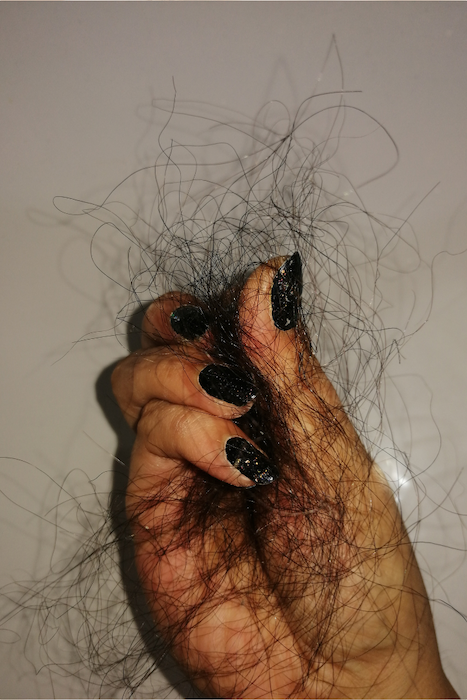
Let’s get one thing straight — your hair doesn’t just fall out for no reason. Most of the time, something internal is triggering it. And more often than not, that “something” is hormones.
Hormones are your body’s chemical messengers. They influence everything from mood to metabolism — and yes, even hair growth. When they’re in balance, your hair typically follows a healthy cycle: growth, rest, shed, repeat. But when hormones are out of sync? That cycle gets disrupted.
Here are a few of the most common hormonal culprits behind thinning hair:
1. DHT: The Follicle Shrinker
Dihydrotestosterone (DHT) is a hormone derived from testosterone. And while it’s important for many bodily functions, too much of it can spell trouble for your hair.
DHT binds to receptors in your scalp’s hair follicles and causes them to shrink. Over time, these follicles produce thinner and weaker hairs until they stop producing hair altogether.
This is one of the leading causes of pattern hair loss in both men and women. The good news? Certain nutrients may help naturally block DHT production and protect the follicles — we’ll get into those shortly.
2. Thyroid Imbalance: The Hair Cycle Disruptor
Your thyroid hormones (T3 and T4) help regulate metabolism, including the growth cycle of your hair. If your thyroid is underactive (hypothyroidism), it can slow down this cycle, leading to more hair in the “resting” phase and less in the “growing” phase.
People with thyroid imbalances often notice increased shedding, thinning, and even changes in hair texture. Nutritional support is crucial here, especially when it comes to selenium, which plays a vital role in thyroid hormone metabolism.
3. Low Vitamin D: The Growth Phase Blocker
Vitamin D isn’t just for bones. And it’s not just a vitamin. It’s actually a hormone that activates hair follicles and helps maintain a healthy hair growth cycle. When you don’t get enough of it — and most people don’t — it can delay the anagen (growth) phase of hair development.
That means hair may fall out and take much longer to grow back, or grow back weaker than before. Vitamin D deficiency is surprisingly common, especially in colder climates or for those who spend most of their time indoors.
4. Stress & Cortisol: The Silent Hair Stealer
You might already know that stress can lead to hair loss, but the hormone behind it, cortisol, is often the real reason.
When your body is under chronic stress, cortisol levels rise. This spike can push hair follicles into the “shedding” phase too early. This is known as telogen effluvium, and it can lead to sudden, widespread hair thinning.
Reducing stress is key — but so is supporting your body with adaptogenic and antioxidant-rich nutrients that help it respond to stress more efficiently.
How the Nutrients in Complete Biotin Plus Support Healthy Hair From the Inside Out
Now that we’ve uncovered how hormones like DHT, cortisol, and thyroid hormones can disrupt your hair growth, let’s talk solutions.
While there’s no magic pill for perfect hair, certain nutrients have been shown to support hormone balance, nourish your follicles, and promote healthy hair growth — especially when delivered in a way your body can actually absorb.
That’s where Complete Biotin Plus shines. Here’s how its key ingredients work to support your hair from within:
Biotin – The Hair Growth Powerhouse
Biotin (vitamin B7) is essential for producing keratin, the structural protein that makes up your hair. A deficiency in biotin can lead to thinning, brittle strands, and increased shedding.
But here’s the kicker: not all biotin supplements are easily absorbed. Complete Biotin Plus uses micelle liposomal technology, which helps your body absorb more of this critical nutrient — meaning better support for your scalp and strands.
Biotin has also been shown in studies to improve hair thickness and shine, especially in people with thinning hair or brittle nails.

Vitamin D – Helps Activate Dormant Follicles
As mentioned earlier, low vitamin D levels are linked to various types of hair loss — particularly telogen effluvium and alopecia areata.
Vitamin D helps activate receptors in your hair follicles and encourages them to enter the anagen (growth) phase. Complete Biotin Plus includes a highly bioavailable form of vitamin D to help your follicles fire back up and support consistent hair regrowth.
Selenium – Supports Thyroid & Scalp Health
Selenium is a trace mineral that plays a major role in thyroid hormone production. And since your thyroid controls the speed of your hair cycle, that’s a big deal.
But selenium’s benefits don’t stop there. It also acts as an antioxidant, protecting your scalp from inflammation and oxidative stress that could otherwise damage follicles.
Pumpkin Seed Oil – May Naturally Block DHT
Pumpkin seed oil has gained attention for its potential to inhibit 5-alpha reductase — the enzyme that converts testosterone to DHT. In one study, men who took pumpkin seed oil saw a 40% increase in hair count over 24 weeks.
This makes it a promising, plant-based way to support your body in fighting back against DHT-related hair thinning, especially when combined with the other nutrients in this formula.
Black Cumin Seed Oil – Fights Inflammation & Oxidative Stress
This ancient remedy (also known as Nigella sativa) is loaded with antioxidants and anti-inflammatory compounds, both of which help create a healthy environment for hair to thrive.
By calming inflammation and reducing oxidative damage — two major contributors to follicle miniaturization — black cumin seed oil supports a balanced scalp and healthy regrowth conditions.
Vitamin E – Nourishes Hair & Scalp
Vitamin E is another antioxidant superstar. It helps improve blood flow to the scalp, ensuring your follicles get the nutrients and oxygen they need to grow strong, healthy hair.
Research also suggests vitamin E can reduce oxidative stress, improve shine, and even boost hair count in people dealing with hair thinning.
Together, these ingredients create a synergistic formula — not just targeting hair growth, but supporting the root causes of why your hair may be falling out in the first place.
Your Hair Reflects What’s Happening Inside
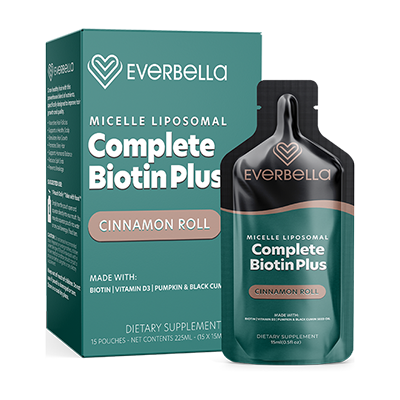
Hair loss can feel discouraging — even a little scary — but it’s rarely random. In many cases, it’s your body’s way of waving a flag and asking for help. And as we’ve seen, hormones play a major role in the health of your hair — often more than age, styling habits, or even genetics.
By supporting your body from the inside out — giving it the nutrients it needs to balance hormones, reduce stress, and nourish your follicles — you’re not just chasing cosmetic results. You’re building a foundation for long-term wellness that shows up in your hair, skin, energy, and more.
If you’re ready to start that process, Complete Biotin Plus is a simple, science-backed way to begin. With targeted nutrients like biotin, vitamin D, selenium, pumpkin seed oil, black cumin seed oil, and vitamin E — all delivered in highly absorbable micelle liposomal form — it’s designed to give your body what it needs to thrive.
Because when your body feels supported… your hair knows it.
>>> I’m offering up to 35% off on Complete Biotin Plus right now – click here to claim this offer
The Inflammation-Collagen Link No One’s Talking About
You’re doing everything “right” — eating well, staying active, maybe even taking a collagen supplement every day.
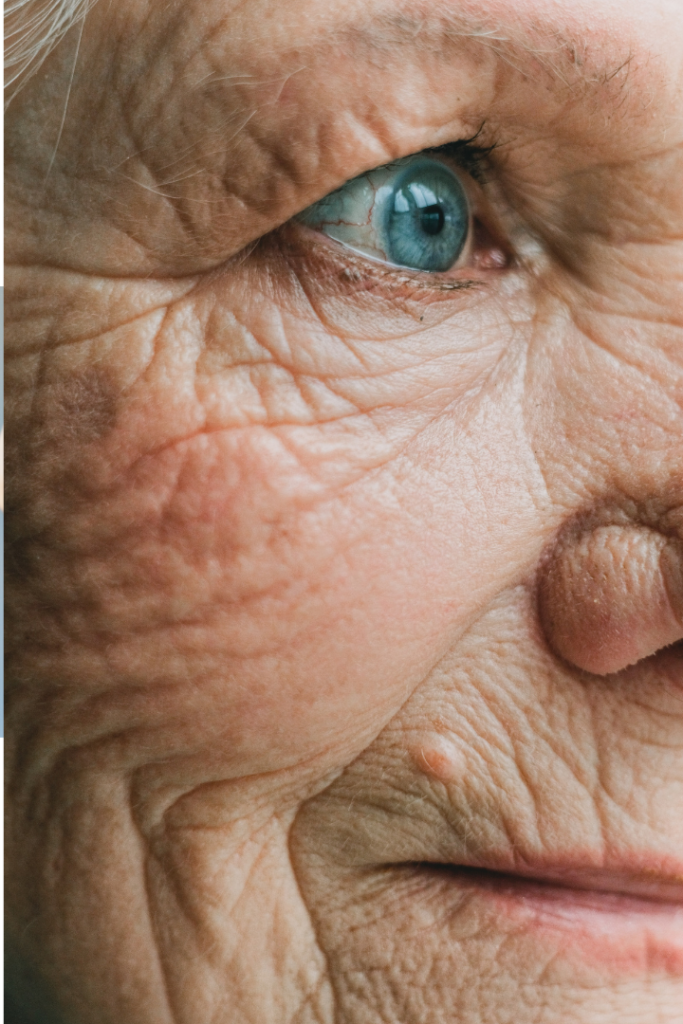
So why are the signs of aging still creeping in?
- Wrinkles forming faster than you expected…
- Joints feeling stiffer…
- Hair thinning or skin losing its glow?
Here’s something most people (and even many doctors) don’t talk about:
Chronic inflammation might be undoing all your hard work.
While collagen is essential for youthful skin, strong joints, a healthy gut, and vibrant hair — inflammation can actually destroy collagen faster than your body can use it.
Even worse? Many of us have low-grade, hidden inflammation happening every day and we don’t even realize it.
In this blog, you’ll learn:
➡️ What inflammation really is — and why it matters for your collagen levels
➡️ Signs that inflammation is hurting your body
➡️ What you can do about it naturally
➡️ And how to protect your collagen with a little-known supplement your body will love
Let’s dive in.
What Is Inflammation (And Why It’s Not Always Bad)?
Inflammation gets a bad rap, but here’s the truth: it’s actually part of your body’s natural defense system.
When you get a cut or fight off a cold, inflammation is what kicks your immune system into gear to heal and protect you. That’s called acute inflammation and it’s a good thing.
But when inflammation sticks around for too long, even without an injury or illness to fight? That’s when it becomes a problem.
This is called chronic inflammation. And it can quietly damage your tissues and organs, including your body’s ability to make and protect collagen.
What causes chronic inflammation?
❌ Poor diet (especially sugar and ultra-processed foods)
❌ Stress
❌ Air pollution and toxins
❌ Lack of sleep
❌ Sedentary lifestyle
❌ Hidden infections
❌ Gut imbalances
Your body is trying to help you, but it ends up in a constant “on” state, like a fire alarm that never shuts off.
Over time, this can lead to issues like joint pain, dull or aging skin, bloating, brain fog, and even serious conditions like heart disease.
And when it comes to collagen? Chronic inflammation is like a slow leak that drains your reserves day after day — even if you’re taking a supplement.
How Inflammation Wrecks Collagen
Collagen is like the scaffolding of your body. It keeps your skin firm, your joints cushioned, your hair strong, and even supports gut health.
But chronic inflammation? It’s one of the biggest enemies of collagen.
Here’s what happens behind the scenes:
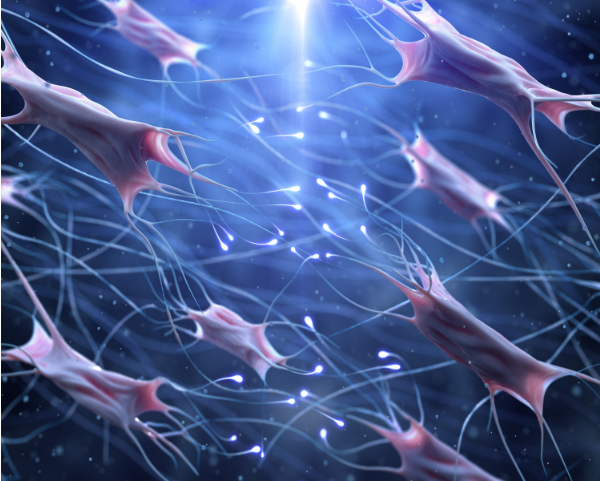
1. Inflammation activates collagen-destroying enzymes
Your body produces enzymes like collagenase and elastase in response to inflammation. These enzymes are supposed to help break down damaged tissue so your body can rebuild.
But with chronic inflammation, these enzymes go into overdrive and end up destroying healthy collagen too.
Think: sagging skin, aching joints, weaker hair strands, and gut lining issues.
2. It slows down your collagen factories
Your body makes collagen using cells called fibroblasts. But chronic inflammation can damage or suppress these cells, making it harder for your body to create new collagen in the first place.
So even if you’re eating collagen-rich foods or taking supplements, your body might not be able to keep up with the breakdown.
3. It increases oxidative stress
Chronic inflammation generates free radicals — unstable molecules that damage cells. These free radicals can directly damage existing collagen and interfere with how it’s absorbed or used in your body.
The bottom line?
If you’re not also addressing inflammation, your collagen routine might not be doing as much as you think.
Let’s take a look at some signs that inflammation may already be impacting your collagen…
7 Subtle Signs Inflammation May Be Hurting Your Collagen
Chronic inflammation can be sneaky. You may not feel “sick,” but your body might still be waving red flags — especially when it comes to your collagen levels.
Here are 7 subtle signs that inflammation might be breaking down your collagen faster than you can rebuild it:
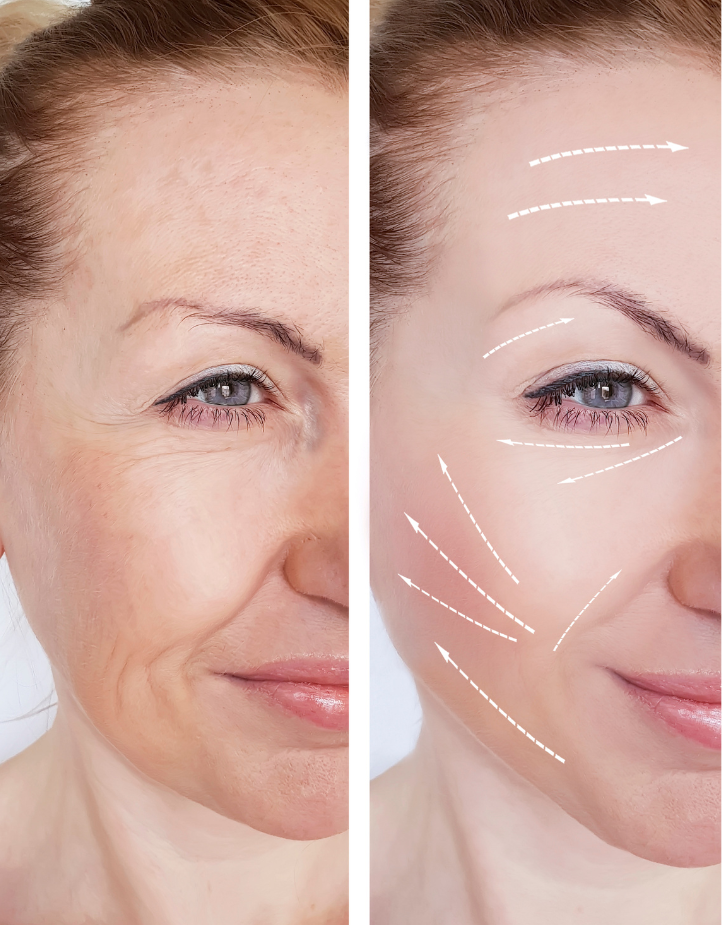
1. Fine lines and wrinkles that seem to come out of nowhere
If your skin is suddenly looking older, thinner, or more fragile — even though you’re taking collagen — inflammation could be the culprit.
It damages collagen structure and weakens skin’s elasticity over time.
2. Dull, tired-looking skin
Collagen is essential for a healthy skin barrier and that “lit-from-within” glow.
Inflammation can impair circulation, hydration, and collagen synthesis — making skin look tired, blotchy, or dehydrated.
3. Joint stiffness or discomfort
Collagen cushions your joints. If inflammation is degrading that collagen, you might feel creaky or sore — especially in the morning or after being inactive.
4. Digestive issues
Did you know your gut lining is made largely of collagen?
Inflammation can thin the gut lining and reduce collagen’s protective effects, leading to bloating, discomfort, or food sensitivities.
5. Slower muscle recovery
If your muscles feel more sore than usual or take longer to recover after exercise, inflammation could be breaking down collagen in connective tissues and slowing repair.
6. Hair thinning or brittle nails
Hair and nails are made of keratin, but they rely on collagen for strength and structure. If they’re breaking more easily or growing slowly, it could be a sign your collagen is under attack.
7. Feeling “off” — tired, foggy, or rundown
Low energy, mental fog, or general malaise are classic signs of systemic inflammation.
And if your body’s resources are spent fighting inflammation, it may deprioritize collagen production.
Sound familiar?
Don’t worry — you can take steps to reverse this damage.
Let’s explore how to naturally protect your collagen by calming inflammation from the inside out…
How to Protect Your Collagen by Lowering Inflammation
The good news? You’re not powerless against inflammation or the collagen loss it causes.
By making small changes to your daily routine, you can help your body fight back, naturally rebuild collagen, and start to look and feel better from the inside out.
Here’s how:
1. Eat an anti-inflammatory diet
Load up on colorful fruits and veggies, healthy fats (like olive oil and avocado), and omega-3-rich foods like salmon and flaxseeds.
Cut back on sugar, ultra-processed snacks, and seed oils like canola or soybean oil.
These dietary shifts can reduce inflammatory markers and support collagen synthesis.
2. Move your body daily
Gentle movement — like walking, yoga, or resistance training — helps reduce inflammation and improves circulation, getting nutrients where they’re needed for collagen repair.
Plus, exercise itself can stimulate collagen production in connective tissues!
3. Sleep like your skin depends on it (because it does)
Your body makes the most collagen while you sleep.
Chronic sleep deprivation increases inflammation and cortisol, both of which break down collagen.
Aim for 7–9 hours a night to give your body time to repair and replenish.
4. Manage stress
Stress triggers cortisol, which increases inflammation and breaks down collagen.
Try deep breathing, meditation, nature walks, or journaling to help bring your nervous system back into balance.
Even just 10 minutes a day can make a difference.
5. Support your body with targeted nutrients
Certain nutrients help your body create and protect collagen while also calming inflammation.
Three of the most powerful?
- Vitamin E: A potent antioxidant that helps shield collagen from free radical damage.
- DHA (from algae): An anti-inflammatory omega-3 that supports skin health and reduces collagen breakdown.
- MCT oil: Provides cellular energy and helps your body absorb fat-soluble vitamins like E.
All three work together to calm inflammation and help your body hold on to the collagen it has while making more of it, naturally.
⭐ These aren’t just nice to have — they’re essential. And they’re all found in one delicious daily supplement: EverBella’s Complete Collagen Plus.
More on that in a moment…
Why Most Collagen Supplements Don’t Work
So many people start taking collagen… only to feel like it’s not doing anything.
Here’s why that happens:
1. Poor Absorption
Most collagen powders and capsules are hard for your body to absorb. Collagen molecules are large — and without the right delivery system, they can pass right through your digestive tract unused.
2. Sugar in the Formula
Some collagen products are packed with sugar to improve taste. But sugar can actually damage collagen in your body through a process called glycation — where sugar molecules stick to proteins (like collagen) and break them down. Not ideal.
3. Missing Support Nutrients
Your body doesn’t just need collagen — it also needs certain fats and antioxidants to properly use it. Without ingredients like healthy fats and vitamin E, your collagen supplement may fall short.
✅ Why Complete Collagen Plus Is Different
Complete Collagen Plus is designed to overcome all of these common issues.
- It uses Micelle Liposomal delivery, making it highly absorbable and easy for your body to put to work.
- It contains no sugar — so you’re not canceling out the benefits.
- It includes powerhouse nutrients like vitamin E, algal DHA, and MCT oils to support healthy collagen use, protect against oxidative damage, and boost cellular health.
- And it comes in a delicious, sugar-free caramel-flavored liquid that’s a treat to take daily.
No mixing. No clumping. No chalky aftertaste.
Just pure collagen support, in the most bioavailable form possible.
Support Your Collagen, Support Your Glow
You already lose collagen every year as you age. And if inflammation is in the mix, that breakdown happens even faster.
But now you can do something about it — naturally and effectively.
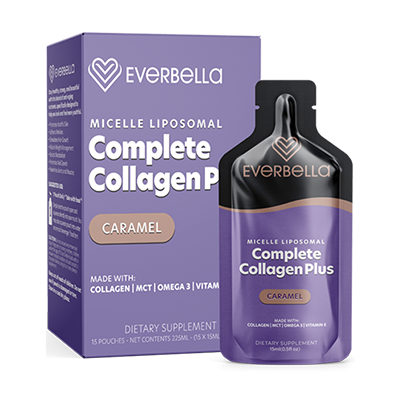
Complete Collagen Plus gives your body what it needs to rebuild and protect its collagen from the inside out:
- ✅ Easy-to-use liquid form
- ✅ Maximum absorption with micelle liposomal delivery
- ✅ Sugar-free formula with rich caramel flavor
- ✅ Backed by antioxidant nutrients for full-body support
If you want healthier skin, stronger joints, and better hair — this is the daily collagen supplement that actually works.
👉 Try EverBella’s Complete Collagen Plus today — and save up to 25% for a limited time!
Aging is inevitable. But how you support your body through it? That part’s up to you.
Can You Get Vegan Collagen?
Spoiler: Not exactly — but here’s what you can do.
Let’s face it, collagen is everywhere these days.
From powders and pills to fancy lattes and skincare serums, it’s become a must-have in the world of beauty and wellness. And for good reason: collagen plays a major role in how firm, smooth, and youthful our skin looks. Not to mention the strength of our hair, nails, joints, and even gut lining.
But if you’re someone who avoids animal products — whether you’re vegan, plant-based, or just prefer different options — you might be wondering…
“Can I take a vegan collagen supplement?”
It’s a great question. And the answer might surprise you. Because technically, there’s no such thing as true vegan collagen.
But don’t worry — that doesn’t mean you’re out of luck. In fact, there’s a natural and delicious way to help your body make more collagen, no animal products required.
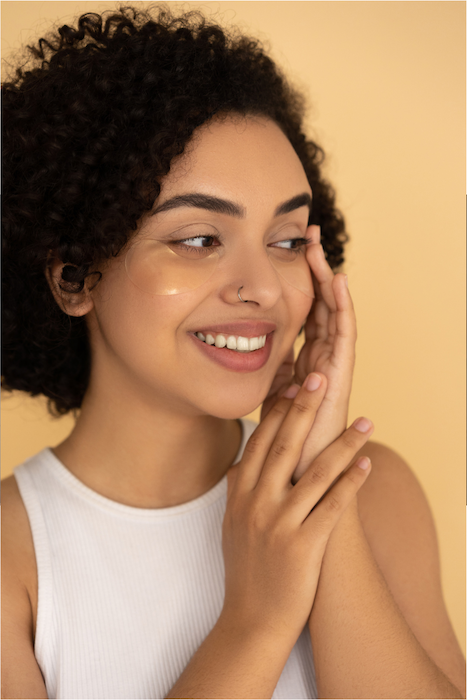
In this article, we’ll explain:
- Why collagen is so important for your body (especially for women)
- Why you won’t find a true vegan collagen supplement
- What you can take instead: a powerful category of nutrients called collagen boosters
- The key ingredients that actually help your body make its own collagen — naturally
- And how EverBella’s NutraBoost Gummies give you all of that in one tasty, fruity bite
Let’s get into it!
Why Collagen Is So Important (Especially for Women)
Collagen is the most abundant protein in your body.
Think of it as your body’s “glue.” It helps hold your skin together, keeps your joints moving smoothly, supports gut lining, strengthens hair and nails, and even gives structure to your bones.
But here’s the problem: Your body starts making less collagen as early as your 20s. And that natural decline only speeds up over time.
By the time you hit your 40s and 50s, collagen levels can drop dramatically. And for women, the biggest drop usually comes during menopause. In fact, studies have found that women can lose up to 30% of their collagen in the first five years after menopause alone!
So what does that mean?
You might start to notice:
- Fine lines and wrinkles becoming more pronounced
- Sagging or thinning skin
- Weak nails that break easily
- Hair that’s dull or falling out more than usual
- Achy joints or stiffness
- Slower recovery after workouts or minor injuries
On top of the aging process, we’re also exposed to everyday things that speed up collagen loss like sun exposure, poor sleep, processed food, alcohol, and stress.
That’s why collagen support is more than a beauty trend — it’s a daily essential for many women who want to feel strong, radiant, and energized as they age.
But if you’re trying to avoid animal products, that brings up a tricky question.
Can you still get collagen without animal sources?
Let’s find out…
Can You Actually Get Vegan Collagen?
Short answer? Not really.
While there are plenty of supplements claiming to be vegan collagen, here’s the truth:
Real collagen only comes from animals.
It’s found in the skin, bones, and connective tissues of cows, chickens, fish, and other animals. Plants simply do not make collagen, so any supplement that says it contains vegan collagen is either misleading or referring to something else entirely.
That doesn’t mean you’re out of options, though.
Because even if you can’t consume true collagen as a vegan, you can still do something just as effective — maybe even better…
You can help your body make its own collagen.
How? By giving it the exact nutrients and cofactors it needs to naturally produce and protect collagen from within.
These are called collagen boosters and they’re an exciting, plant-based way to support your skin, hair, nails, and joints without relying on animal products.
Let’s explore what they are and how they work.
Enter: Collagen Boosters
It’s true that vegan collagen doesn’t exist. So, what’s the next best thing?
Collagen boosters. 🌱
These are nutrients and plant-based compounds that don’t contain collagen. Instead, they help your body create more of its own.
Your body already knows how to make collagen. But to do it well, it needs the right raw materials: vitamins, minerals, antioxidants, and amino acids. When those are missing, your collagen production slows down — and it shows.
But when you fuel your body with these collagen-supporting nutrients?
✨ That’s when the magic happens.
You may notice:
- Smoother, firmer skin
- Stronger nails
- Fuller, shinier hair
- Better joint comfort
- And even improved gut and bone health
And here’s the best part:
Collagen boosters are 100% vegan-friendly and work with your body’s natural processes.
That’s exactly what you’ll find in EverBella’s Collagen NutraBoost Gummies — a delicious, plant-based gummy designed to give your body everything it needs to boost its own collagen, naturally.
Let’s take a look at what’s inside and how each ingredient supports your skin, hair, and joints from the inside out.
What’s In a Collagen Booster? (And Why It Works)
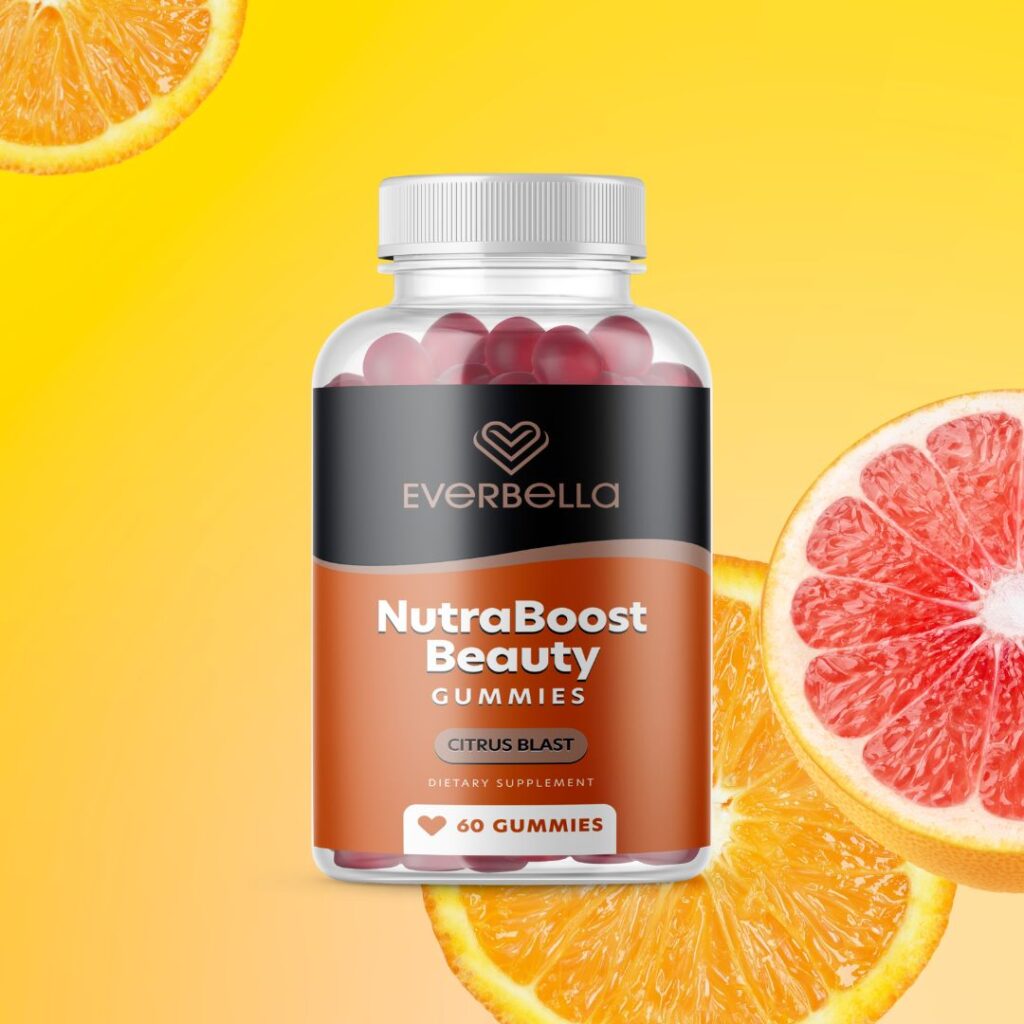
Not all collagen boosters are created equal.
To really support your body’s collagen production, you need a blend of essential vitamins, minerals, and powerful plant extracts that work together. That’s exactly what EverBella’s NutraBoost Gummies deliver — in a tasty, citrus formula you’ll actually look forward to taking every day!
Here’s a closer look at the superstar ingredients inside and what they do:
Vitamin A
Supports skin cell turnover and helps regulate genes involved in collagen production. It’s essential for maintaining firm, youthful skin.
Vitamin C
Your body can’t make collagen without it. Vitamin C helps form and stabilize collagen molecules, while also protecting your skin from oxidative stress.
Vitamin E
A powerful antioxidant that helps protect your collagen from being broken down by free radicals — especially from sun exposure.
Folate (Vitamin B9)
Supports DNA synthesis and cell repair, which is key for skin regeneration and collagen formation.
Biotin (Vitamin B7)
Famous for supporting stronger hair and nails, biotin also plays a role in the health of your skin and the production of structural proteins.
Pantothenic Acid (Vitamin B5)
Helps rebuild skin structure, retain moisture, and promote overall skin healing — all important for healthy collagen.
Zinc
Crucial for collagen synthesis and tissue repair. It also supports the immune system and helps keep skin clear and balanced.
Sodium
Supports skin hydration by helping nutrients travel into your cells — a key part of healthy, glowing skin.
Bamboo Leaf Extract
Rich in silica, a mineral that helps strengthen skin, hair, and nails — and supports collagen formation from the ground up.
Amla Berries
Used for centuries in Ayurvedic beauty rituals, amla is packed with vitamin C and antioxidants that promote skin firmness and elasticity.
Japanese Knotweed
This plant is rich in resveratrol, which supports skin elasticity, healthy aging, and may help protect existing collagen from breaking down.
Grape Seed Extract
Full of oligomeric proanthocyanidins (OPCs), which help prevent collagen breakdown and protect skin from environmental stress.
All of these ingredients come together in EverBella’s NutraBoost Gummies — a plant-based formula that works with your body to restore collagen the natural way.
Your Body Can Still Get That Collagen Glow — The Vegan Way
It’s true. You can’t walk into a store and pick up a bottle of real vegan collagen.
But now you know the good news: You don’t need to.
Because your body is already equipped to make collagen. You just need to give it the right building blocks to do its job.
That’s where collagen boosters come in.
By nourishing your body with the vitamins, minerals, and plant-based compounds it needs, you can naturally support:
- Firmer, smoother skin
- Stronger, shinier hair
- Healthier nails and joints
- And that youthful glow we all want to hang onto a little longer
And EverBella’s Collagen NutraBoost Gummies make it so easy (and delicious).
Each gummy is packed with everything your body needs to support its own collagen production — including skin-loving nutrients like vitamin C, biotin, bamboo leaf, amla berries, and more.
No animal products. No powders. No pills. Just a sweet, citrus bite of vegan-friendly beauty support — every single day. 🍊
👉 Click here to try NutraBoost Gummies for yourself — and get up to 25% off today!
Fix ALL Your Hair Woes With These 8 Oils
Let’s be honest—we all want great hair. But some days, your hair just won’t cooperate. Maybe it’s super frizzy. Or dry. Or itchy. Or breaking off like crazy. Sound familiar?
The good news? You don’t need to spend a fortune to fix it. Mother Nature already gave us some amazing oils that can help solve the most common hair problems—naturally.
In this blog, we’re diving into 6 of the most annoying hair issues (and the BEST oils to help with them!).
You’ll also get my easy DIY hair spray that uses these oils to give your hair a total refresh. Let’s go!
1. Frizz That Won’t Quit? Try Argan Oil
Frizz happens when your hair is thirsty. It soaks up moisture from the air—and that causes puffiness and wild flyaways.
Enter: Argan oil. It’s rich in vitamin E and healthy fats that smooth out the hair shaft and lock in moisture. Plus, it helps protect hair from heat and sun, making it a must-have for dry or color-treated hair.
Research indicates that argan oil improves hair elasticity and hydration, reducing breakage and frizz over time. [1, 2]
2. Dry, Itchy Scalp? You Need Jojoba Oil
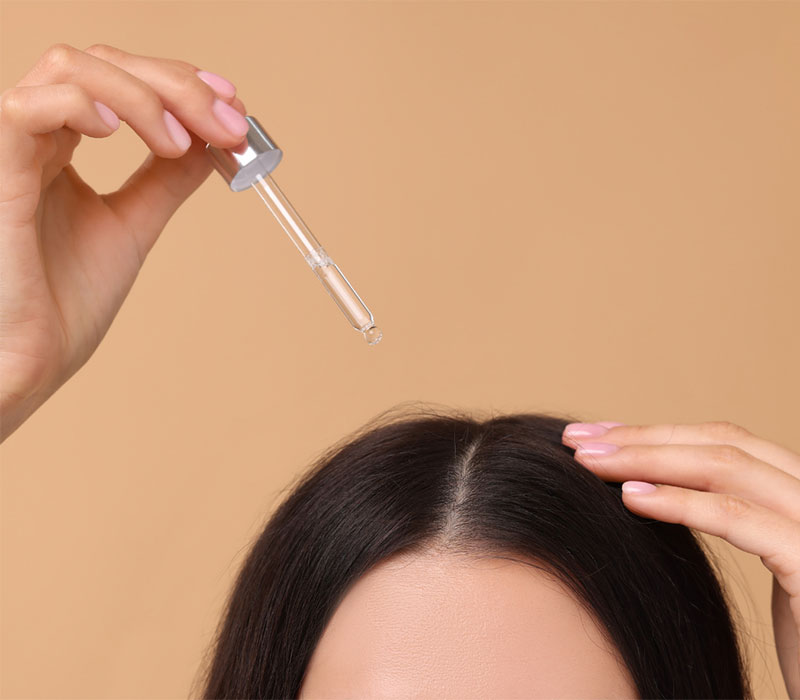
If your scalp feels like the desert, you could be dealing with dryness—or even early signs of dandruff. Jojoba oil is a natural fit here because it’s super similar to the oil your scalp already makes.
That means it moisturizes without clogging pores, and it can help calm flaking and itchiness. In fact, studies show that jojoba oil may reduce inflammation and support skin barrier repair. [3]
Bonus: It won’t leave your scalp greasy!
3. Thinning or Shedding Hair? Rosemary Oil is Your New BFF
If your ponytail is feeling thinner these days, you’re not alone. Stress, hormones, and aging can all affect hair growth.
Luckily, rosemary oil has been shown to support thicker, fuller hair. In one 2015 study, it worked just as well as minoxidil (the common hair-growth drug, Rogaine) when applied regularly over six months—but with fewer side effects! [4]
It works by improving circulation to the scalp, which helps feed your hair follicles and encourage new growth.
4. Dandruff? Green Tea Seed Oil Can Help
Yes—green tea seed oil is a thing, and it’s awesome for your scalp.
This oil is full of antioxidants and anti-inflammatory compounds that can help calm irritation and even fight dandruff-causing fungi. One study even showed that green tea extracts reduced scalp flaking and redness when applied topically. [5]
If you’ve tried everything for your dandruff, this lesser-known oil might be your answer.
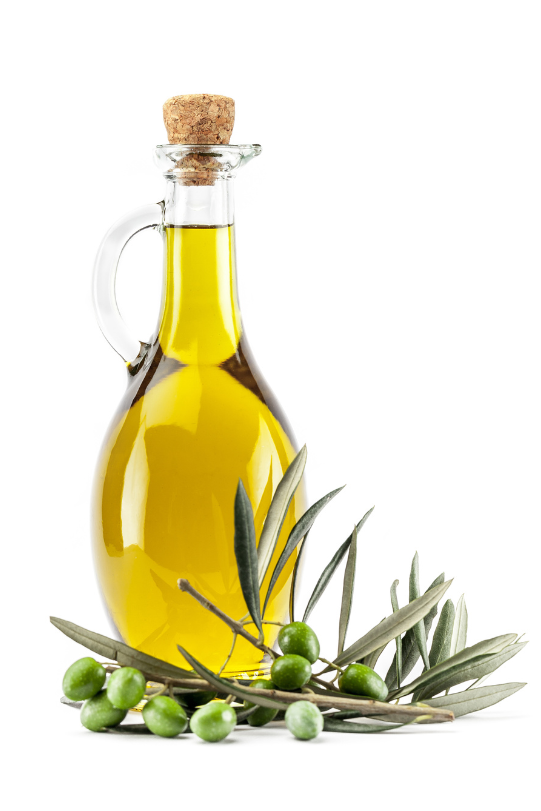
5. Super Dry Hair? Olive Oil to the Rescue
Olive oil isn’t just for cooking—it’s a deep conditioning miracle.
It’s packed with healthy fats and antioxidants that coat each strand, helping to seal split ends and bring dry hair back to life. One study found that olive oil reduced hair damage and improved softness when used as a treatment before shampooing. [6]
For best results, warm it up slightly and massage it into your hair before washing.
6. Breakage and Split Ends? Castor Oil Works Wonders
Hair breaking off halfway down the strand? That’s a sign it needs strength.
Castor oil is thick, rich in ricinoleic acid, and known for its strengthening powers. It can help reduce breakage and even boost hair thickness over time. Some researchers also believe its antimicrobial properties help keep the scalp clean and healthy. [2]
Use it in small amounts—it’s super thick but super effective!
7. Oily, Flat Hair? MCT Oil is Surprisingly Light
If you have oily hair, you might think oils are off-limits—but MCT oil (medium-chain triglyceride oil) is different.
It’s lightweight, fast-absorbing, and won’t weigh your hair down. Plus, it helps balance oil production while moisturizing just enough to keep your scalp happy.
Some studies even suggest MCTs have antibacterial benefits, which could help reduce scalp buildup and clogged follicles. [7]
8. Sensitive or Irritated Scalp? Go for Lavender or Peppermint Oil
Essential oils like lavender and peppermint are more than just relaxing scents.
Lavender has been shown to help with hair growth and scalp inflammation, while peppermint provides a cooling effect and improves blood flow to the scalp. One animal study even found that peppermint oil increased hair thickness and depth in just 4 weeks. [8]
Dilute them with a carrier oil (like MCT or jojoba) for the perfect soothing scalp treatment.
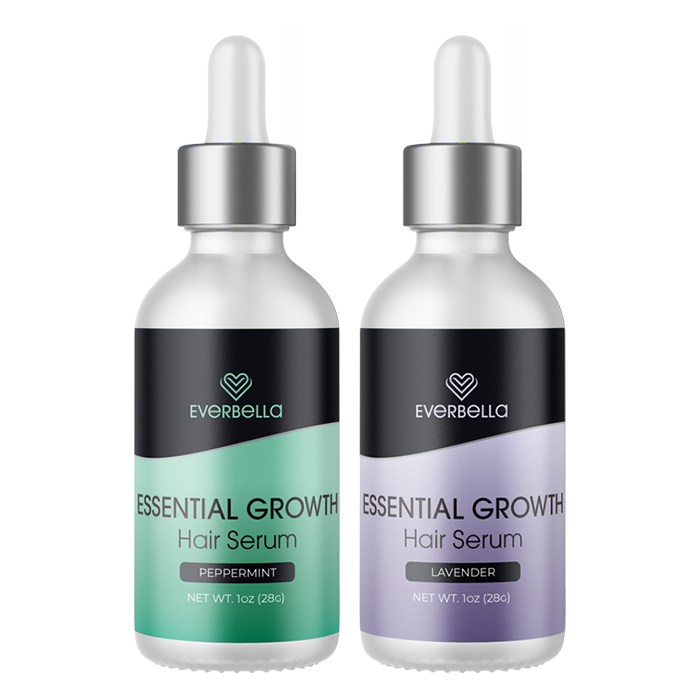
Want to Fix All These Hair Issues at Once?
You’re in luck! I’m going to share my DIY Refreshing Hair Spray recipe with you that has ALL of the above oils in it 🤯
It’s light, refreshing, and designed to support all hair types and concerns—in one simple spray!
👉 But you’re going to want your own EssentialGrowth bottles first.
If you click above, you’ll get all of the oil outlined in this blog to put in your hair every day in one go. It couldn’t be easier!
✨ DIY Lavender & Peppermint Scalp Refresher Spray
What You’ll Need:
- ½ cup distilled water
- 1 tablespoon witch hazel (optional, but helps with oil control and scalp refreshment)
- 5 drops Lavender EssentialGrowth
- 3 drops Peppermint EssentialGrowth
- 1 teaspoon aloe vera gel (soothes and hydrates the scalp)
- Small spray bottle (4–6 oz size works great)
Directions:
- In a small bowl or directly in the spray bottle, combine the distilled water and witch hazel.
- Add the aloe vera gel and essential oils.
- Shake well to combine. (Always shake before each use—oils can separate!)
- Lightly spritz your scalp and roots whenever your hair feels a bit oily, itchy, or in need of a refresh.
- Gently massage into your scalp for extra stimulation and absorption. No rinsing needed!
Do You NEED To Wash Your Hair? Settling The Debate
Let’s be honest—most of us have wondered, “Do I really need to wash my hair today?” You’ve probably heard people say everything from “wash it every day!” to “once a week is enough!”
So, what’s the truth? How often should you wash your hair? And is skipping shampoo actually good for your scalp?
Don’t worry, by the end of this blog, you’ll have the answers to these questions. PLUS, you’ll know what you should be putting on your head every day no matter what.
Let’s get to the bottom of this hair care mystery!
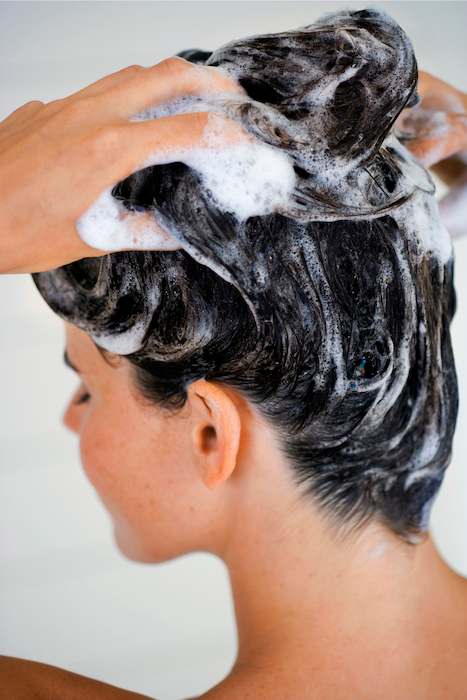
Why We Wash Our Hair in the First Place
Your scalp makes a natural oil called sebum. It keeps your hair soft and helps protect your skin. But over time, oil, dirt, sweat, dead skin cells, and product buildup can make your hair feel greasy or look dull.
That’s where shampoo comes in. Shampoo helps wash away extra oil, dirt, and anything else hanging out on your scalp.
But here’s the twist—not everyone needs to wash their hair the same way.
The Truth: There’s No One-Size-Fits-All Answer
Hair type, lifestyle, age, and even where you live can all change how often you should wash your hair. According to dermatologists from the Cleveland Clinic, most people don’t need to wash daily. In fact, over-washing can strip away too much oil and leave your hair dry or brittle. [1]
Let’s look at what affects your ideal hair-washing routine.
What Affects How Often You Should Wash?
1. Your Hair Type
- Oily hair? You might need to wash every 1–2 days.
- Dry or curly hair? Washing once or twice a week is usually enough. Curly hair needs that extra moisture, and washing too often removes it.
- Fine hair? It tends to show oil faster, so you might feel like you need to wash more often.
- Thick or textured hair? These hair types don’t get oily as quickly and can go longer between washes.
2. Your Scalp
If your scalp gets itchy or flaky, it could be a sign that you’re not washing enough—or sometimes, that you’re washing too much. According to the American Academy of Dermatology, how your scalp feels is just as important as how your hair looks.
3. Your Lifestyle
Do you work out often or sweat a lot? If so, you may need to wash more frequently. Sweat can mix with oil and lead to buildup and even scalp irritation.
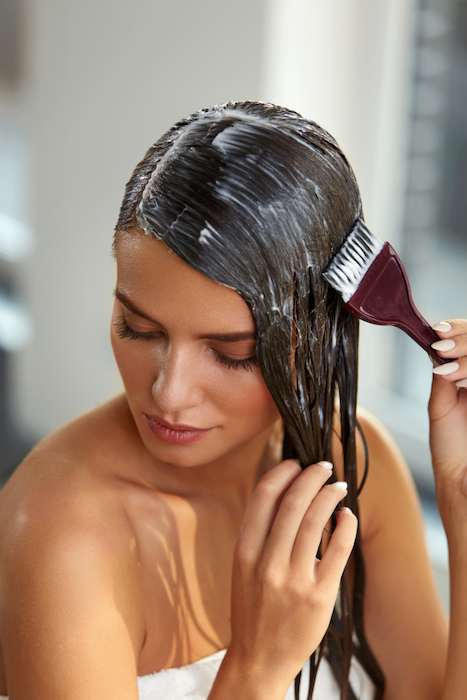
Is It Bad To Wash Your Hair Every Day?
Not necessarily—but it depends on the products you use and your hair type.
Washing daily with a gentle, sulfate-free shampoo can be fine for people with oily hair or who exercise regularly. But using harsh shampoos or washing too often can dry out your hair and damage the protective outer layer called the cuticle.
A 2017 study published in the International Journal of Trichology found that frequent shampooing can weaken hair over time, especially if it’s not followed with conditioner. [2]
What Happens If You Don’t Wash Your Hair?
Skipping washes isn’t always bad—your scalp may adjust and produce less oil over time. Some people swear by the “no-poo” movement (no shampoo), using only water or natural cleansers like apple cider vinegar.
But for others, not washing can cause:
- Greasy roots
- Product buildup
- Scalp odor
- Itching or dandruff
In a 2016 study from the Journal of Cosmetic Dermatology, researchers found that not cleansing the scalp regularly can lead to increased microbial activity, which may cause irritation or inflammation. [3]
(But there’s actually something you can do about this – keep reading to find out what…)
What About Dry Shampoo?
Dry shampoo is a quick fix that soaks up extra oil. It’s perfect for busy days—but it’s not a real replacement for washing. Overusing it can clog hair follicles and cause buildup.
Dermatologists say to use dry shampoo sparingly—no more than 1–2 times between real washes.
Tips for a Healthy Hair-Washing Routine
✅ Use gentle, sulfate-free shampoos
✅ Follow with conditioner to protect and hydrate
✅ Don’t use super hot water—warm is best
✅ Massage your scalp—it boosts circulation and helps remove buildup
✅ Listen to your hair—if it feels dry or oily, adjust accordingly
So… How Often Should You Wash?
Here’s a basic guide:
| Hair Type | Suggested Wash Frequency |
| Oily or fine hair | Every 1–2 days |
| Normal hair | Every 2–3 days |
| Dry, curly, or thick hair | Once or twice a week |
| Color-treated hair | 2 times a week or less |
| After workouts or sweating | As needed (rinse or gentle wash) |
Remember, this is just a guide. Your hair is unique—do what works best for you!
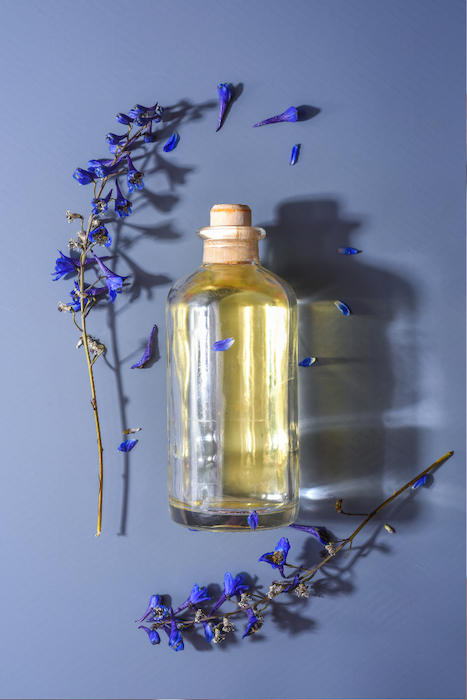
Lavender & Peppermint Oil: Natural Helpers Between Wash Days
So, you’re spacing out your shampoos to avoid over-washing—but what about your scalp? This is where essential oils like lavender and peppermint come in handy. These natural oils can help you keep your scalp clean, balanced, and refreshed without needing to reach for the shampoo bottle.
🌿 Lavender Oil: A Clean Scalp Without the Suds
If you’re worried that not washing your hair often might lead to buildup or itchiness, lavender oil could be your new best friend. It has antimicrobial and antibacterial properties, which means it helps fight off the microbes that can cause dandruff, irritation, and even minor scalp infections.
In fact, one study showed that lavender oil effectively inhibits the growth of several types of fungi and bacteria commonly found on the scalp. [4]
Even better? Lavender oil has been shown to promote hair growth, thanks to its ability to increase circulation and reduce inflammation. So while you’re giving your shampoo bottle a break, lavender oil is still helping your scalp stay healthy and your hair thrive.
🌿 Peppermint Oil: Cooling, Cleansing, and Growth-Boosting
Peppermint oil does more than just smell nice. That fresh, tingling feeling it gives your scalp? That’s a sign it’s increasing blood flow to your hair follicles—something that can help stimulate growth and reduce thinning.
A 2014 study found that peppermint oil significantly increased hair growth in mice compared to even minoxidil (a popular hair loss treatment). [5]
Peppermint oil also has antiseptic and anti-inflammatory properties, making it great for keeping your scalp clean and less oily in between washes. It can help reduce itchiness and flakiness without stripping your scalp’s natural oils—so you stay fresh and balanced without overwashing.
How to Use Them Between Washes
- Mix a few drops with a carrier oil (like jojoba or coconut) and massage into your scalp between wash days.
- Add to a water-based spray for a DIY scalp refresher.
- Use as a treatment before your next wash to help detox your scalp naturally.
If you’re trying to wash your hair less but don’t want to deal with buildup or greasy roots, lavender and peppermint oil offer a natural, science-backed way to keep your scalp clean and your hair looking its best.
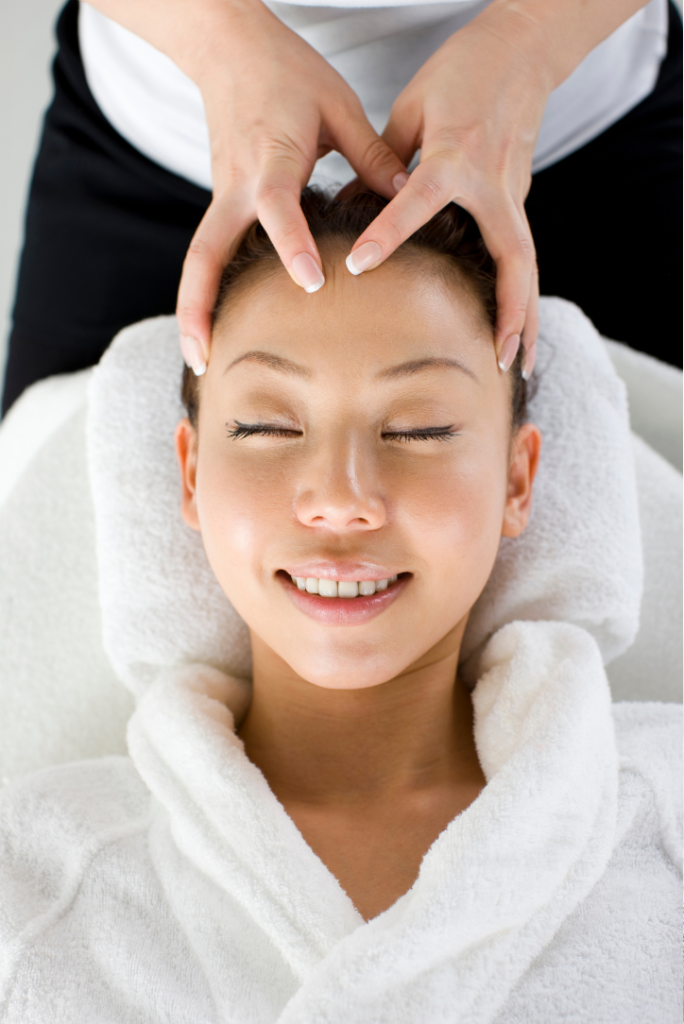
✨ DIY Lavender & Peppermint Scalp Refresher Spray
What You’ll Need:
- ½ cup distilled water
- 1 tablespoon witch hazel (optional, but helps with oil control and scalp refreshment)
- 5 drops lavender essential oil
- 3 drops peppermint essential oil
- 1 teaspoon aloe vera gel (soothes and hydrates the scalp)
- Small spray bottle (4–6 oz size works great)
Directions:
- In a small bowl or directly in the spray bottle, combine the distilled water and witch hazel.
- Add the aloe vera gel and essential oils.
- Shake well to combine. (Always shake before each use—oils can separate!)
- Lightly spritz your scalp and roots whenever your hair feels a bit oily, itchy, or in need of a refresh.
- Gently massage into your scalp for extra stimulation and absorption. No rinsing needed!
Bottom Line
There’s no one rule for everyone. You might need to wash every day, or only once a week. The real trick is paying attention to your hair and scalp. If it looks and feels healthy, you’re probably doing it right.
So whether you’re team daily wash or team skip-a-few, now you’ve got the science-backed info to make the best call for your locks!
And when it comes to boosting your hair health with these incredible essential oils, EverBella can help.
Right now, I’m giving BOTH oils for the price of one!
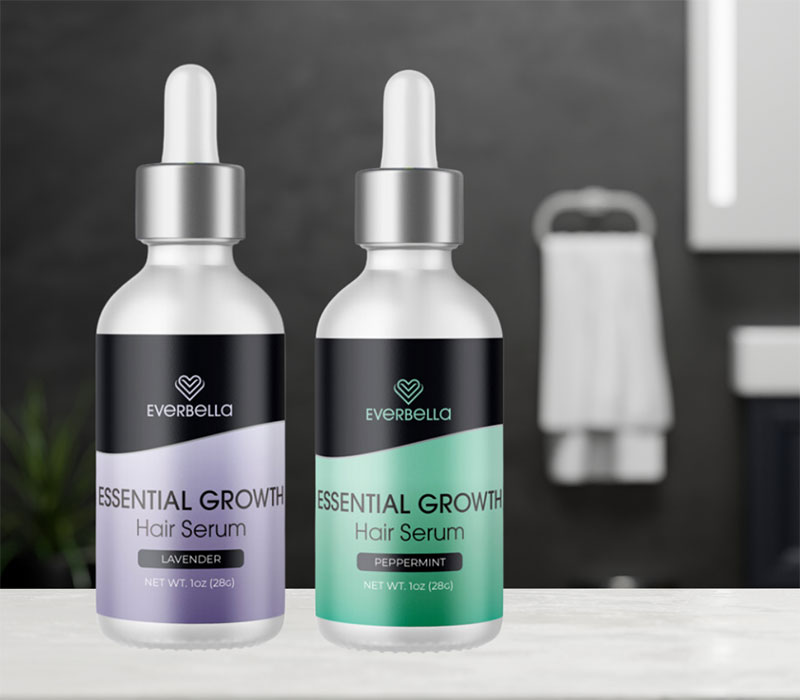
Which Oil Is Best for Hair: Olive Oil or Avocado Oil?
If you’ve ever looked for ways to nourish and strengthen your hair, you’ve probably come across the idea of using oils.
From deep conditioning to taming frizz, hair oils have been used for centuries to keep locks looking luscious and healthy. And let’s be real—most of us have reached into our kitchen cabinets at some point, wondering if those cooking oils could work wonders for our hair.
So today, I’m putting two powerhouse oils head-to-head: olive oil vs. avocado oil!
Which one is better for your hair? Let’s find out!
How Oils Benefit Your Hair
Before we get into the battle of the oils, let’s talk about why using oil on your hair is such a great idea in the first place.
Hair oils work by penetrating the hair shaft, delivering moisture, nutrients, and fatty acids that help strengthen and protect your strands. Plus, they create a natural barrier that locks in hydration and shields your hair from damage caused by heat, styling, and the environment.
Some oils are lightweight, meaning they absorb quickly without leaving a greasy residue, while others are heavier, providing deep conditioning and extra protection.
The right oil for you depends on your hair type and what kind of nourishment your strands need!
Olive oil and avocado oil have their differences when it comes to supporting your hair. Let’s see how they compare and why you should choose one over the other.

Olive Oil: Deep Moisture and Shine
Olive oil has been a beauty secret for centuries, and for good reason! Packed with antioxidants, vitamins A and E, and healthy fats, this rich oil provides deep moisture to dry and damaged hair. It helps smooth frizz, tame flyaways, and add a gorgeous shine to your locks.
Why you’ll love it:
➡️ Ultimate hydration – Perfect for dry, coarse, or curly hair types that need intense moisture.
➡️ Strengthens hair – The vitamin E and fatty acids in olive oil help reinforce hair strands, reducing breakage and split ends.
➡️ Soothes the scalp – If you struggle with dandruff or an itchy scalp, olive oil can provide much-needed relief by hydrating and nourishing the skin.
As such, you should choose olive oil if your hair craves deep hydration, needs extra protection against dryness, or if you have thick, coarse, or curly hair that benefits from intense moisture. Olive oil’s rich composition makes it an excellent choice for restoring and strengthening damaged strands.
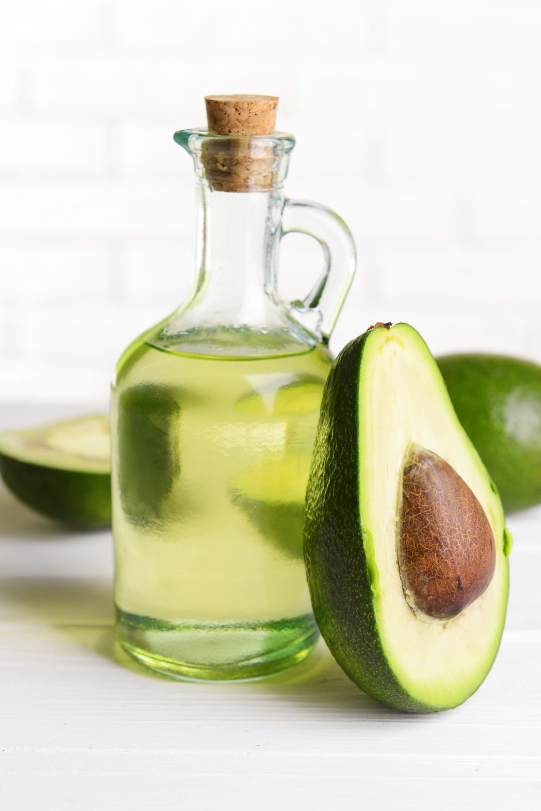
Avocado Oil: Lightweight and Nutrient-Rich
Avocado oil is another hair-loving superstar! It’s loaded with essential nutrients like biotin, magnesium, and vitamin D, all of which support healthy hair growth and scalp health. Plus, its lightweight texture makes it a great option for those who want the benefits of oil without the heaviness.
Why you’ll love it:
➡️ Absorbs quickly – Unlike heavier oils, avocado oil soaks into the hair shaft fast, making it perfect for fine or medium hair types.
➡️ Supports hair growth – Biotin and other essential vitamins help strengthen hair and promote growth from the root.
➡️ Protects against heat damage – Avocado oil has a naturally high smoke point, making it a great heat protectant before styling.
Avocado oil should be your hair wellness go-to if you have fine to medium hair that needs nourishment without feeling weighed down. It’s also a great option if you’re looking to support hair growth, protect against heat styling, or want an oil that absorbs quickly without leaving a greasy residue.
WAIT—You Don’t Have to Choose!
Now, here’s the best part: You don’t actually have to pick between these two amazing oils! And it’s not because you can use one and then the other (BIG pain in the butt!) but because…
Both olive oil and avocado oil are in my EssentialGrowth Hair Serums!
That means you get the deep moisture of olive oil AND the lightweight nourishment of avocado oil—all in one powerhouse formula.
